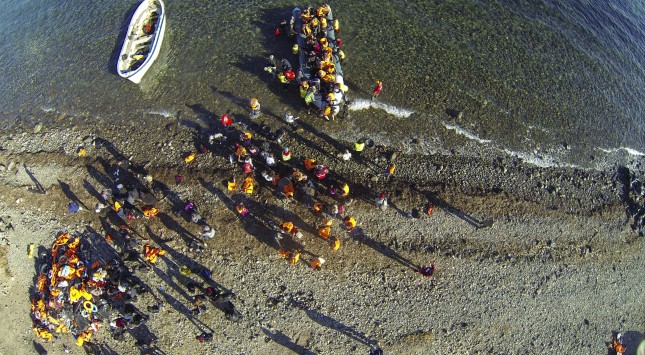-
Climate Change is a Security Issue: An Interview with Geoff Dabelko
October 29, 2020 By Cindy Zhou
Climate change is a threat multiplier; it is an underlying and exacerbating factor that makes things worse at a level that all actors, including security actors, need to pay attention to, said Geoff Dabelko, Professor and Associate Dean at the George V. Voinovich School of Leadership and Public Affairs at Ohio University and Senior Advisor to the Wilson Center’s Environmental Change and Security Program. He spoke in a recent interview about climate change and security as part of CimpaticoTV’s Climate Adaptation Channel.
“Climate change fundamentally impacts the political economic stability of a country,” said Dabelko. In the case of the Syrian Civil War, many experts point out how severe drought adversely affected opponents of the regime, potentially contributing to the protests that preceded the conflict. The situation is complex and climate change is not the sole factor involved—such issues do not have simple answers and explanations, said Dabelko. But if we ignore these dynamics, he said, we overlook how displacement and mobility are impacting people.
There is a general acceptance among governments that climate change has implications for agriculture, the economy, and health that all countries face, said Dabelko. Some places experience its effects more acutely than others, especially countries that are not well-equipped to respond. Climate and security linkages in the Lake Chad Basin has been a particular focus to some degree in the UN and among the G7, particularly Germany, which has consistently been involved in contributing resources and taking action in the region, said Dabelko.
Despite this recognition of climate change’s connection to stability, we’re still a long way from translating it into resources, he said. In some countries, though, the military and intelligence community are integrating climate assessments into their strategies and operations. In the European Union, the military has begun to see the importance of efficient battery technology, including protection against grid failures and reducing vulnerabilities, he said.
While the focus on climate and security links has centered around how climate change contributes to conflict, we must be wary of “backdraft” dynamics as well, said Dabelko. Sometimes well-intentioned climate change responses may exacerbate conflict. When it comes to renewable energy, the sourcing of biofuels from West Africa could adversely affect local livelihoods because farmers might not be able to afford land, he said, while hydropower projects often cause displacement. Similarly, efforts to reduce emissions from deforestation and degradation benefit ecosystems but whether the money goes to local communities is a concern. Ultimately, “we have to go in with our eyes open so that we’re not exacerbating conflicts or creating new ones because of the spin-offs of what we’re doing in the climate space,” said Dabelko.
Finally, addressing climate change and security links requires a multidisciplinary approach. “[O]ur notions of security are broadening. And so, that is a conversation that we want to actively push forward,” said Dabelko. “You can’t do that from a disciplinary silo.” What the traditional security community tells us about decision-making, uncertainty, and risk management can inform environmental approaches. Likewise, environmental studies are changing the security landscape.
“And these issues demand that you break down the characters and the stereotypes that we have of each other, let alone just the practical impediments of working across disciplines, sectors,” Dabelko said. Folks coming from the environment and climate side, he said, are doing a whole lot more than hugging trees and pandas.
Sources: Africa Renewal, Cimpactico Studios, Current Climate Change Reports, European Defence Matters, Indiana Journal of Global Legal Studies, International Institute for Environment and Development, ReliefWeb.
Photo Credit: Aerial image from above with Syrian migrants/refugees as they arrive from Turkey on a boat near Molyvos, Greece, courtesy of Nicolas Economou/Shutterstock.com.
Topics: backdraft, climate change, conflict, cooperation, environment, environmental security, Eye On, video
 A Publication of the Stimson Center.
A Publication of the Stimson Center.



